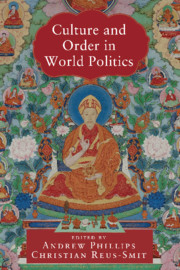Book contents
- Culture and Order in World Politics
- LSE International Studies
- Culture and Order in World Politics
- Copyright page
- Contents
- Additional material
- Contributors
- Preface
- Part I Introduction
- Part II Historical Orders
- Part III The Modern ‘Liberal’ Order
- 6 Cultural Diversity within Global International Society
- 7 Liberal Internationalism and Cultural Diversity
- 8 When Liberal States Bite Back
- 9 Global Institutional Imaginaries
- Part IV Constitution and Contestation
- Part V Conclusion
- References
- Index
6 - Cultural Diversity within Global International Society
from Part III - The Modern ‘Liberal’ Order
Published online by Cambridge University Press: 25 December 2019
- Culture and Order in World Politics
- LSE International Studies
- Culture and Order in World Politics
- Copyright page
- Contents
- Additional material
- Contributors
- Preface
- Part I Introduction
- Part II Historical Orders
- Part III The Modern ‘Liberal’ Order
- 6 Cultural Diversity within Global International Society
- 7 Liberal Internationalism and Cultural Diversity
- 8 When Liberal States Bite Back
- 9 Global Institutional Imaginaries
- Part IV Constitution and Contestation
- Part V Conclusion
- References
- Index
Summary
The chapter examines the relationship between cultural diversity and the institutions of international society. It is concerned with the the impact of cultural diversity on the institutions of international society, with the capacity of those institutions to allow cultural diversity to play out in the least disruptive manner possible, and with finding space for the promotion of just claims for cultural recognition. It suggests, firstly, that the institutions of the supposedly pluralist international society have never provided a religiously and culturally neutral set of institutions able to mediate claims of difference and conflicting values. Second, the chapter questions the traditional pluralist emphasis on the nation-state, highlighting the hybrid character of the dominant units, and shows how empires instituted empire-specific diversity regimes that were subsequently disrupted by geopolitical conflict and competition. Finally, it explores the tensions between the deepening of global governance on the one hand and the more recent reassertion of demands for harder sovereignty, often as an explicit container for cultural or civilizational difference.
Keywords
- Type
- Chapter
- Information
- Culture and Order in World Politics , pp. 115 - 136Publisher: Cambridge University PressPrint publication year: 2020
- 3
- Cited by

